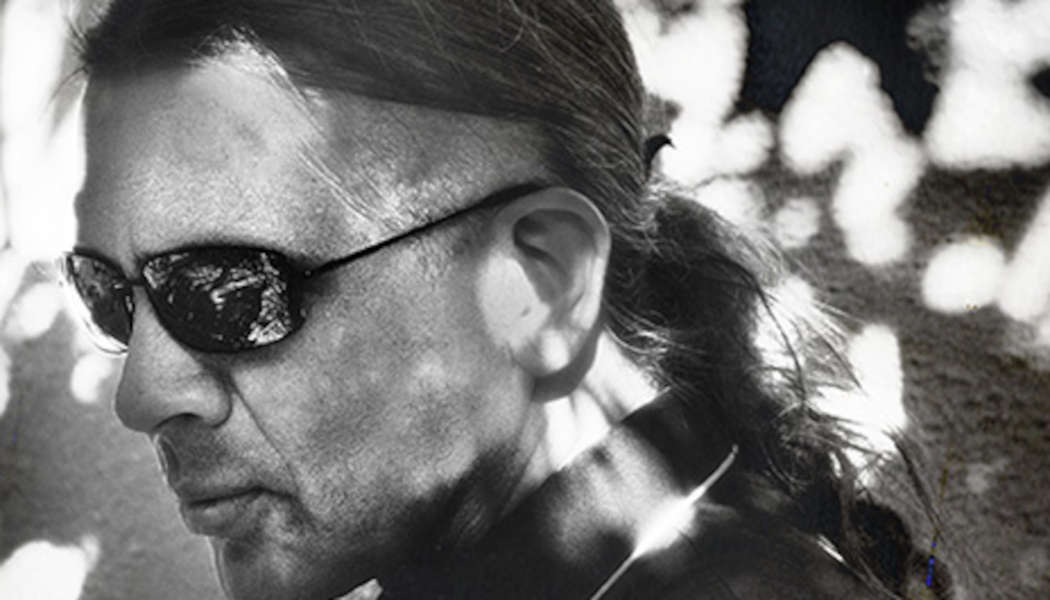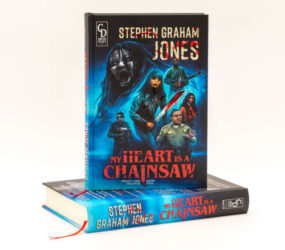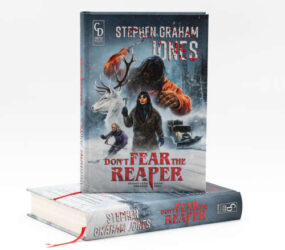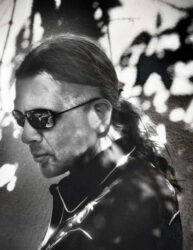Interview mit Stephen Graham Jones
Stephen Graham Jones ist einer der spannendsten Horror-Autoren. Zum einen weil er einfach gut erzählen und Spannung aufbauen kann, zum anderen aber auch wegen den Themen und seinem frischen Zugang dazu. Aber auch originelle Charaktere, flotte Dialoge und ein starker, einprägsamer Stil sprechen für ihn (man merkt vielleicht, dass ich persönlich ein großer Fan von ihm bin). Mit My Heart is a Chainsaw und Don’t Fear the Reaper veröffentlicht der Buchheim Verlag die ersten beiden Teile der Indian Lake-Trilogie in wunderschönen illustrierten Hardcover-Editionen. Passend dazu durften wir uns mit Stephen Graham Jones unterhalten. Es geht um Inspirationen, seinen Schreibprozess, wie er eine Verfilmung besetzen würde und wie es funktioniert aus der Perspektive einer Teenagerin zu schreiben.
pressplay: Your novel My Heart is a Chainsaw is heavily influenced and inspired by horror stories. What were some of the biggest influences on your novel and which horror movies and books would you recommend?
Stephen Graham Jones: Scream (1996) is probably the biggest influence on My Heart is a Chainsaw. Well . . . it and Geoffrey Eugenides‘s The Virgin Suicides. That novel’s why I wrote Chainsaw. But The Cabin in the Woods too, I guess. And, okay, Halloween (1978). And the young-adult novel Monster, by Walter Dean Myers.
For readers who are yet unfamiliar with your work, which of your novels would you recommend to a new reader?
Depends if they’re already in the deep end of horror, maybe? If they are, then Chainsaw. If they usually don’t read the bloody stuff, then maybe . . . Mongrels? But, The Only Good Indians too—it’s a click or two more intense. Or, if a sampler platter’s better—small bites—Night of the Mannequins or Mapping the Interior. Both novellas, so, can read them in a single sitting, maybe, decide whether my stuff’s right or not. (Anmerkung: alle Titel sind im Buchheim Verlag erschienen, bzw. Mongrels erscheint Mitte 2024)
When you start working on a new novel, do you start with characters, plot, a certain image or setting? How did you come up with the idea for My Heart is a Chainsaw?
I don’t start with anything but a bad idea, really. Never have pre–formed characters, a nailed-down plot. With My Heart is a Chainsaw, I guess I wrote the seed of it in this story that ran in Cemetery Dance in 2006, „Raphael“. But I thought I was done with it, too. I guess when I rehabbed Chainsaw from the 2013 version I’d written—this is 2017, 2018—I did have Indian Lake, a version of Sheriff Hardy, and Terra Nova. But nobody or nothing else. Jade just stepped in completely unannounced, and took the whole thing over. I just had to follow behind, write everything down.
What does your writing day look like?
Wake up, drink a Soylent or eat some leftovers, do twenty minutes or so of email and social media, then, if no other obligations—or sometimes in spite of those obligations—I like to write straight through until lunch. After lunch, I’m usually out on my mountain bike or at the gym or sneaked off to a movie or thrift store, then I’m back at the keyboard around 4pm, to write until dinner. On a good day, I can stitch together five hours of writing. Other days, no hours at all.
Was it difficult to write from the perspective of a Teenage-Girl? How did you channel your inner Teenage-Girl in the writing process?
Jade and I share a lot. I colored my hair, back when. I was a janitor during high school. I got sent home for my t-shirt decisions. I was the only Indian kid at my school. I grew up in a small town. So, all of that just came natural. But, no, I was never a high school girl. For that I had, first, to kind of just guess. My daughter was in high school at the time, though, which helped. And I had some early readers who had been high school girls, who were very helpful. They don’t tell me what to do, but they will tell where I’m messing up.
What was the most difficult thing about becoming a writer? And what is the most difficult part of being a writer nowadays?
Most difficult part about being a writer’s probably the most difficult part about any occupation: how can I get experience so you, the publisher or employer, can trust me, if I don’t have any experience? Getting your foot in the door that first time takes a lot of timing, a lot of luck, and just a whole lot of persistence. Once you have a few publications to put on your cover letter, the magazines and journals and reviews and publishers take you a bit more seriously. But getting those few publications to list . . . it’s always an uphill thing. As it should be, I think.
If it was up to you, who would be your favourite director for an adaption of My Heart is a Chainsaw? And what would your dream cast look like?
Leigh Janiek, directing. And, dream cast. I’d say Fairuza Balk as she was in The Craft, say? Or, really, maybe Devery Jacobs in Fairuza Balk’s Craft-mode, since I’m dreaming. For Letha . . . maybe Mickey Guyton? She’s got that final girl look. Theo Mondragon’s an important role, too. Mahershala Ali, maybe? Idris Elba?
Can you tell us something about your current project?
Currently writing a vampire novel. Who knows if it holds together or not. Still the first couple of weeks of working on it. But it’s fun so far.
Is there some advice that you can give aspiring writers?
Read outside your genre. That’s how you smuggle new DNA back to the genre you love, and new DNA is what keeps a genre vital.
What is the one question you never get asked in interviews, but would really like to answer?
What’s the biggest hole in your video library? As in, something everyone else has seen, that you’ve somehow missed, and missed again, and are still missing? And, keep it to horror. Toxic Avenger. Well, actually that and Street Trash. Don’t know why I’ve never cued either of those up, but I still haven’t. Maybe I’m saving them? Not sure. And, Toxie’s getting or’s got a remake soon, yes? I need to get on watching these. They might change me forever. Maybe even for the better.
Thank you very much for your time and answers.




